
Carl Peter Thunberg, also known as Karl Peter von Thunberg, Carl Pehr Thunberg, or Carl Per Thunberg, was a Swedish naturalist and an "apostle" of Carl Linnaeus. After studying under Linnaeus at Uppsala University, he spent seven years travelling in southern Italy and Asia, collecting and describing people and animals new to European science, and observing local cultures. He has been called "the father of South African botany", "pioneer of Occidental Medicine in Japan", and the "Japanese Linnaeus".
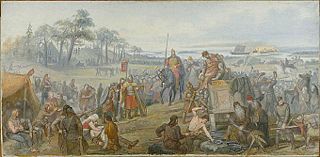
Fyrisvellir, Fyris Wolds or Fyrisvallarna was the marshy plain (vellir) south of Gamla Uppsala where travellers had to leave the ships on the river Fyris (Fyrisån) and walk to the Temple at Uppsala and the hall of the Swedish king.
The kting voar, also known as the khting vor, linh dương, or snake-eating cow is a bovid mammal reputed to exist in Cambodia and Vietnam. The kting voar's existence as a real species should be regarded as questionable, and it is now thought to simply be a hoax made from water buffalo horns.

An'ei (安永) was a Japanese era name after Meiwa and before Tenmei. This period spanned the years November 1772 through March 1781. The reigning emperors were Go-Momozono-tennō (後桃園天皇) and Kōkaku-tennō (光格天皇).
Jakob Friedrich Ehrhart was a German botanist, a pupil of Carl Linnaeus at Uppsala University, and later director of the Botanical Garden of Hannover, where he produced several major botanical works between 1780 and 1793. Ehrhart was the first author to use the rank of subspecies in botanical literature, and he published many subspecific names between 1780 and 1789.

Thunbergia is a genus of flowering plants in the family Acanthaceae, native to tropical regions of Africa, Madagascar and southern Asia. Thunbergia species are vigorous annual or perennial vines and shrubs growing to 2–8 m tall. The generic name honours the Swedish naturalist Carl Peter Thunberg (1743-1828).

Perizoma flavofasciata, the sandy carpet or sandy rivulet, is a moth of the family Geometridae. The species was first described by Carl Peter Thunberg in 1792. It is found in most of Europe and northern Africa and east across the Palearctic to the Urals and the Altai Mountains. The species prefers meadow valleys, floodplains, waterside areas, bushy meadows and gardens. In the Alps it rises to 1500 metres.
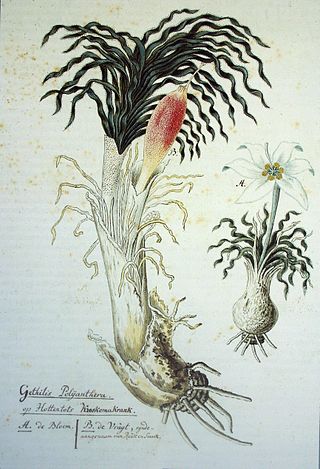
Gethyllis, commonly called Kukumakranka, Koekemakranka, or Kroekemakrank, is a genus of bulbous plant in the Amaryllid family with some 33 accepted species. It is native to the Cape Provinces, the Northern Provinces and the Free State of South Africa, as well as Botswana and Namibia.
Cymaroa is a monotypic of tiger moth genus in the family Erebidae erected by George Hampson in 1905. Its only species, Cymaroa grisea, was described by Carl Peter Thunberg in 1784. It is found in Lesotho, Namibia and South Africa.
Göran (Georg) Rothman, was a Swedish naturalist, physician and an apostle of Carl Linnaeus. The standard author abbreviation Rothman is used to indicate this person as the author when citing a botanical name.

Donacaula forficella is a species of moth of the family Crambidae described by Carl Peter Thunberg in 1794. It is found in China (Heilongjiang), Europe and South Africa.

Macaria fusca is a moth of the family Geometridae first described by Carl Peter Thunberg in 1792. It is found in Alps, Fennoscandia, the Ural, northern Yakutia and Kamchatka. It is found at elevations of up to 3,400 meters.
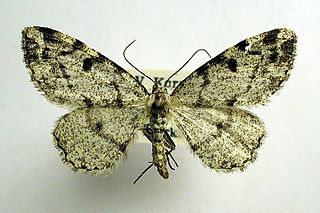
Alcis jubata, the dotted carpet, is a moth of the family Geometridae. The species was first described by Carl Peter Thunberg in 1788. It is found in central Europe, Scandinavia and northern Italy.
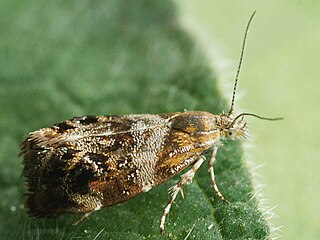
Tebenna bjerkandrella is a moth of the family Choreutidae first described by Carl Peter Thunberg in 1784. It is found from Europe, Morocco, Madeira and the Canary Islands through central Asia to Japan. It has also been recorded from South Africa.
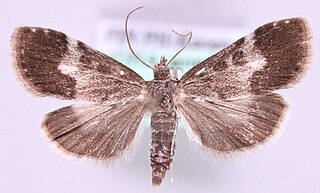
Udea hamalis is a species of moth in the family Crambidae described by Carl Peter Thunberg in 1788. It is found from Fennoscandia south to Switzerland and Ukraine and from France east to Russia.

Elegia tectorum, previously Chondropetalum tectorum or Restio tectorum, more commonly Cape thatching reed, or dakriet, is a member of the restio family, Restionaceae. It is a tufted perennial growing to between 1.5 and 2.25 m, with deciduous leaf sheaths. Flowers are less than 3 mm long. Petals are smooth or hairy in the upper half. E. tectorum is found in marshes and seeps on deep sand in the Western Cape and Eastern Cape of South Africa.

Carl L. Thunberg, FSAScot is a Swedish popular historian.
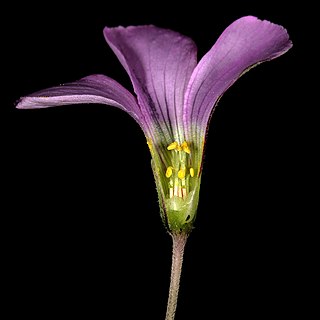
Oxalis bifida is a species of plant. The species was originally described by Carl Peter Thunberg in 1794















